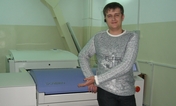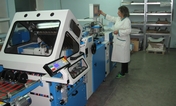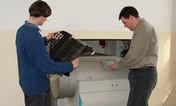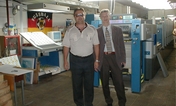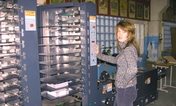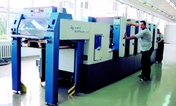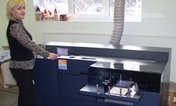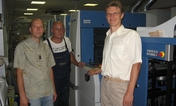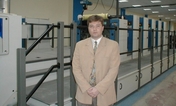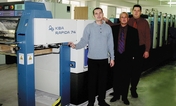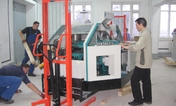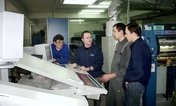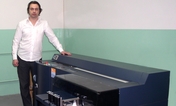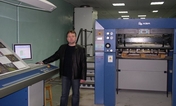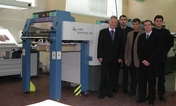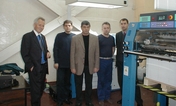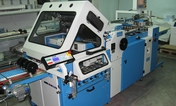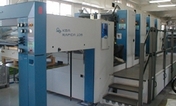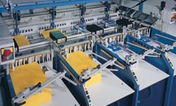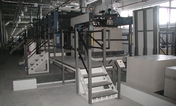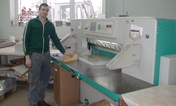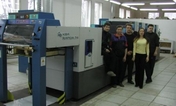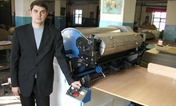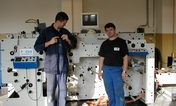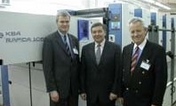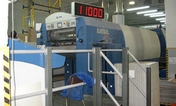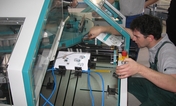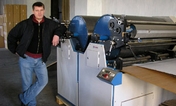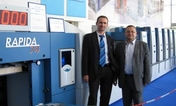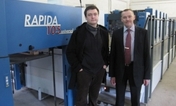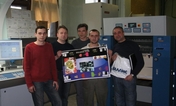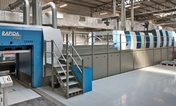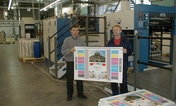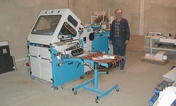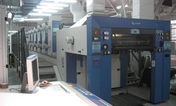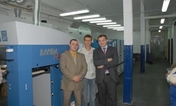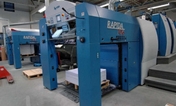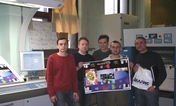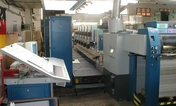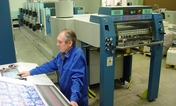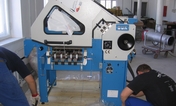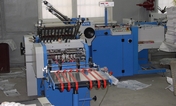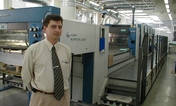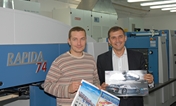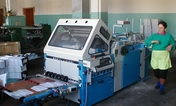By Jon Severs Friday, 16 September 2011
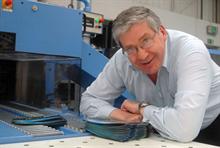
Danforth: "We don't have log jams now and so we can offer a faster service"
ImageData Group's Howden plant sits on a sweet spot on Britain's road network. Within 10 miles of the digital small- and large-format facility, one of three sites the company operates, you have: the M62, the north of England's main east-west route; the M18, for connecting to the M1 for travelling south; and the A1 for going north.
"It was purpose-built on that spot of land by us for that incredible position", says chief executive David Danforth.
It's this attention to detail that has seen the 17.9m-turnover company go from strength to strength since now-chairman Roger Birkin set it up in 1983. Serving retail, corporate and public sector clients, it has four print sites: the digital plant at Howden, its headquarters in Willerby that runs litho kit, a digital operation in Brighton and a screen business in Leeds.
"It has been useful to have multiple sites as it helps with resilience", says Danforth. "It does bring its complications as well, as we have to sometimes move products between sites, but that’s life - there are pluses and minuses to every situation".
Unfortunately for ImageData, the weighting was very much behind the minuses column when it came to its trusty old Muller Martini Bravo stitcher. Danforth is reluctant to call it unreliable, opting instead for "tired".
"To call it unreliable would be harsh", he says. "It had just been around too long, it didn't have the ability to set up quickly because it wasn't electronic as the modern ones are. If we had a big job on, but needed to take it off to run a small job that had to be out sooner, it was a real faff and not an easy task at all. It led to a lot of downtime".
The hunt began, then, for a replacement. Though ImageData did look at a number of manufacturers, the 226-staff company has a long relationship with Muller Martini and runs numerous bits of its kit, so that brand had a head start. Also, as soon as the manufacturer realised the company was in the market for an upgrade, they stepped in with an attractive offer.
"The Primera is the direct replacement for the Bravo range, offering greater efficiency and 25%-shorter set-up time", explains Andreas Schillinger, Muller Martini UK managing director. "It's a robust work-horse for the sheetfed and web offset environment for efficient processing of folded sections and, therefore, suits the 24/7 environment down to the ground".
Build quality
Danforth was impressed, especially with the build of the machine. He explains that, with some machines, you can see that they are a bit lightweight and, although they may be cheaper, it's a false economy as you will end up replacing the machine earlier than you would like. Also, if you are running three shifts, as ImageData does, a machine going down for a few hours has a massive impact as work has already been committed. He believes reliability is paramount, even if it costs a little extra.
There was also the fact that, as is the case with many printers, sticking with the incumbent supplier was deemed less risky.
"I think there are a couple of reasons why people tend to stay with the incumbent supplier", explains Danforth. "One, you know you're dealing with; and two, you know that if they have serviced and maintained an existing machine well, you can have some confidence that they will do the same for the next machine. And there is a lot to be said for that.
We have all bought machinery and then looked at the service after the event and thought 'Well, that's not what they said it would be like'. At the end of the day, if we have a problem with Muller, we can pick up the phone and talk to the UK director as we have a long history of dealing with him - that helps".
The machine was installed just before Christmas last year and Danforth reports that it took around a week for the whole system to be attached and up and running. He says that, as with every new installation, there were minor teething problems, but that they were quickly dealt with.
The operators needed training on the machine despite the company having had Muller machines before, as the technology was so much more advanced. Danforth explains that the general principals were the same, but that setting up using the LCD screens as opposed to playing with the mechanics needed some explanation. And despite some initial reluctance, the staff couldn't be happier with their new "toy".
"Like everything, when you put in a new machine there is a degree of trepidation as to what it will mean", says Danforth. "But the staff quickly came around".
Since installation, the machine has brought numerous benefits. Danforth explains that it gives higher speed output in terms of sheets per hour, while it also offers the opportunity to set up jobs quicker, and then retain the details of those jobs.
"So now if we want to interrupt a job, we can do that and then after just hit the revert button and restack the hoppers and you are away to run. It has a lot going for it", says Danforth. "We don't have log jams now and so we can offer a faster service and as a result we do seem to be doing more work".
No more headaches
It's also giving him some peace of mind. Stitching, he says, is a headache most big print companies have regularly, but the Muller buy has given him some respite.
"I used to have the conversation regularly about having to send something out because we were tight on stitching capacity", he explains. "You work on a basis that so much of what you take in will be stitching work and you have to be careful with that as if you take in too much then you either have to send it out or your delivery times start being stretched. That's not an issue I have to consider now, the Muller eats work up - that said, someone will no doubt now go and sell 4m sheets just to prove I should have kept my mouth shut!"
Such has been the impact of this bit of kit that Danforth has every confidence in both recommending it and committing to a repeat purchase if volumes ever allowed.
"We don't have sufficient volume to buy another one, but if we did, I would definitely be inclined to buy one of these", he says. "You can't say fairer than that".
SPECIFICATIONS
- Max speed 13,000 cycles per hour
- Max feeders 16
- Max product thickness 13mm
- Max product size 480x320mm
- Price from 300,000 pounds sterling, depending on configuration
- Contact Muller Martini 01753 657700 mullermartini.com/gb
COMPANY PROFILE
ImageData Group runs four UK sites serving clients in the retail, corporate and public sectors. It has its head office in Willerby where it runs its litho kit; a large- and small-format digital plant at Howden; a digital operation in Brighton; and a screen business in Leeds. It was set up in 1983 by current chairman Roger Birkin and has a turnover of 17.9m pounds sterling and 226 staff.
Why I bought it…
Chief executive David Danforth says that the company's old Muller Martini Bravo stitcher was "tired" and needed to be upgraded to a machine with much more automation in terms of set-up times. "It had just been around too long, it didn't have the ability to set up quickly because it wasn't electronic as the modern ones are. If we had a big job on but needed to take it off to run a small job that had to be out sooner, it was a real faff and not an easy task at all. It led to a lot of downtime", he explains.
How it has performed…
Danforth explains that it gives higher speed output in terms of sheets per hour, while it also offers the opportunity to set up jobs quicker, and then retain the memory of those jobs. "So now if we want to interrupt a job, we can do that and then after just hit the revert button and restack the hoppers and you are away to run. It has a lot going for it", says Danforth. "We don't have log jams now and so we can offer a faster service and as a result we do seem to be doing more work".
Source: PrintWeek.com

